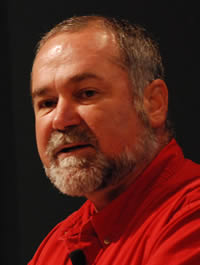“People see him as just a bringer of bad news, but the two most important things in his writing aren’t taken into account. One is the comprehensiveness of his explanation of the technological phenomenon. The second is his powerful moral concern. Those two aspects of Ellul’s thought are not as influential as I’d like them to be.”
“Technology becomes our fate only when we treat it as sacred,” says Darrell J. Fasching, a professor emeritus of religious studies at the University of South Florida. “And we tend to do that a lot.”
Via Manuel Pinto, Artur Alves
Read full article.
EXTRACT:
His central argument is that we’re mistaken in thinking of technology as simply a bunch of different machines. In truth, Ellul contended, technology should be seen as a unified entity, an overwhelming force that has already escaped our control. That force is turning the world around us into something cold and mechanical, and—whether we realize it or not—transforming human beings along with it.
Phi Beta Iota: All of these authors overlook the role of corruption — the lack of integrity and intelligence among decision-makers allocating financial resources. The fact is that technology is like complex financial instruments: a means of defrauding various parties for the benefit of the few. This is one reason why Open Source Everything must apply to all technologies as well as all financial dealings.
See Also:
Jacques Ellul, The Technological Society (Vintage, 1967)
Jacques Ellul, Propaganda: The Formation of Men's Attitudes (Vintage, 1973)
Jacques Ellus, The Subversion of Christianity (Eerdmans, 1986)
Jacques Ellul, Reprint: Money and Power (Wipf & Stock, 2009)
Jerry Mander, In the Absence of the Sacred (Peter Smith, 1999)
Kirkpatrick Sale, Human Scale (New Catalyst, 2007)
John Ralston Saul, Voltaire's Bastards: The Dictatorship of Reason in the West (Vintage, 1993)
Robert Steele, THE OPEN SOURCE EVERYTHING MANIFESTO: Transparency, Truth & Trust (North Atlantic Books, Evolver Editions, 2012)
Clifford Stoll, Silicon Snake Oil: Second Thoughts on the Information Highway (Anchor, 1996)






